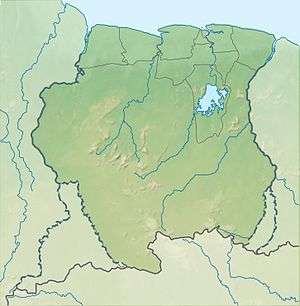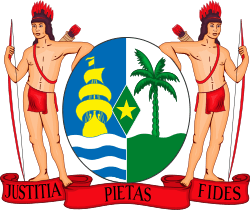1990 Surinamese coup d'état
The 1990 Surinamese coup d'état, usually referred to as the Telephone Coup (Dutch: De Telefooncoup), was a military coup in Suriname which occurred on 24 December 1990. The coup was carried out by Acting Commander-in-Chief of the Suriname National Army (SNL), Police Chief Ivan Graanoogst. As a result of the coup, President Ramsewak Shankar was dismissed from power, and parliament and government were disbanded.
| 1990 Surinamese coup d'état | |||||||
|---|---|---|---|---|---|---|---|
 Map of Suriname. | |||||||
| |||||||
| Belligerents | |||||||
|
|
| ||||||
| Commanders and leaders | |||||||
|
|
| ||||||
 Nexus of coup in Paramaribo | |||||||

Background
On 25 February 1980, a military coup d'état occurred in Suriname. It was organized by Senior Sergeant Dési Bouterse. Bouterse started to rule Suriname like a dictator, heading the National Military Council (promoting himself to Lieutenant Colonel, the highest rank in the SNL). He dissolved the National Assembly, suspended the Constitution, imposed a state of emergency in the country and created a special tribunal, which considered the cases of members of the previous government.
In 1987, Bouterse agreed to reinstate the Constitution and hold election, on the condition that he remain the head of the SNL.[1] However, in the November 1987 general election, the National Democratic Party (the party headed by Bouterse) received only 3 of 51 seats in the National Assembly, while the opposition received 40. The presidential election held on 25 January 1988 was won by Ramsewak Shankar,[2] who was disliked by the SNL, and Henck Arron, who was overthrown in the 1980 coup, was appointed Prime Minister. Tension between the government and the SNL was growing. on 22 December 1990, Bouterse resigned as Commander-in-Chief, stating that he could not fulfill the role of a clown who "does not have pride and dignity." He was succeeded by Graanoogst in acting capacity.
The coup
On 24 December 1990, around midnight Suriname Time (UTC−03:00), Graanoogst told President Shankar by telephone that he was being deposed and he and his government "had better stay home".[3] On 27 December the government was dismissed, the National Assembly dissolved[4] and Johan Kraag was appointed acting President on 29 December.[5] On 31 December Bouterse was reappointed as Commander-in-Chief of the SNL.[3]
World reactions
The Netherlands reacted negatively to the coup and stopped allocating funds for the development of Suriname. Only after the inauguration of President Ronald Venetiaan in 1991 did relations between Suriname and the Netherlands improve significantly.[3]
The whole international community negatively perceived the coup and, under its pressure, the SNL was forced to hold the May 1991 general election with the participation of international observers.[4]
Consequences
Less than a year later, Lieutenant Colonel Bouterse again transferred power to the civilian government, which was again led by the opposition. Since then, Suriname has been governed by coalition government. From 1991 to 1996, the President was Ronald Venetiaan, an opponent of Bouterse. In the 2010 presidential election, Bouterse was elected President of Suriname.[1]
References
- "Президентом Суринама легитимно стал бывший диктатор страны Боутерсе". RIA Novosti (in Russian). 19 July 2010. Retrieved 8 January 2019.
- Rotary International (July 1988). The Rotarian. Rotary International. p. 60.
- "Journal of Suriname and Caribbean Studies" (PDF).
- "СУРИНАМ | Энциклопедия Кругосвет" (in Russian). krugosvet.ru. Retrieved 8 January 2019.
- "World IN BRIEF: SURINAME: Army's Presidential Choice Takes Oath". The Los Angeles Times. 30 December 1990. Retrieved 20 March 2019.
Bibliography
- Aniel P. Bangoer: De telefooncoup: grondwet, recht en macht in Suriname, Uitg. Bangoer, Zoetermeer, 1991. ISBN 9090046356
